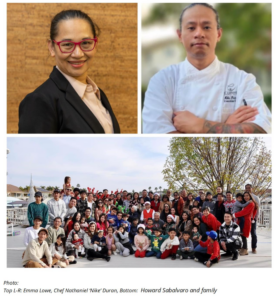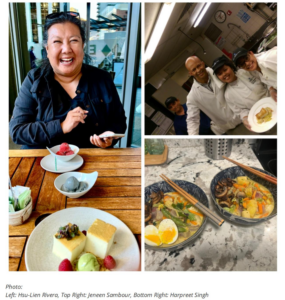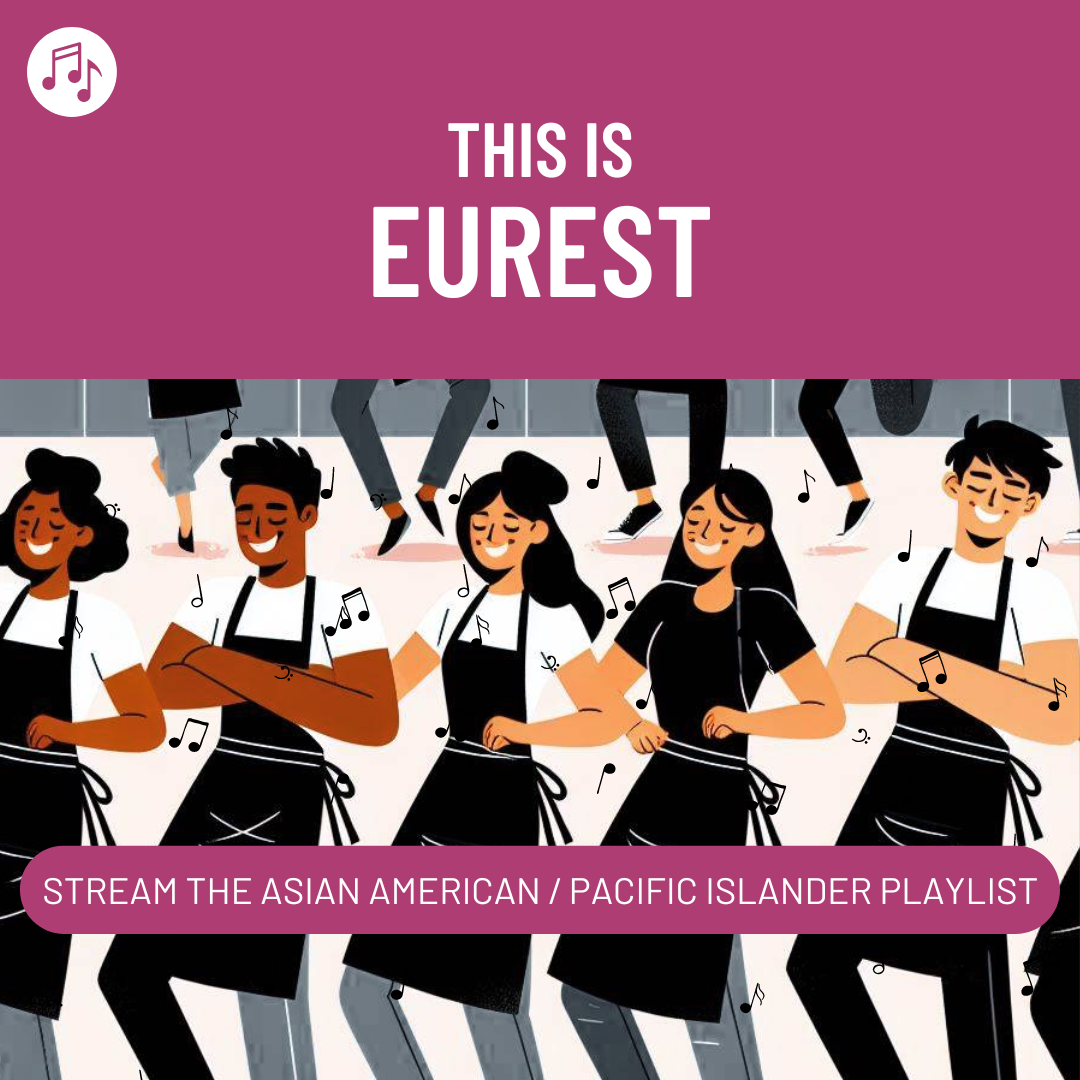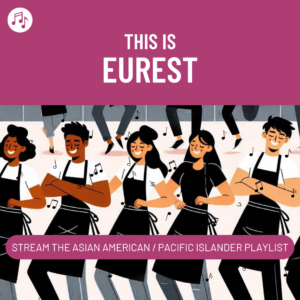Cultural Connect: A Conversation About Asian Pacific American Heritage
The 2024 Asian Pacific American Heritage Month theme of “Advancing leadership through innovation” has allowed Eurest associates to express their ideation and creativity as we tell their stories.
As an additional element of creativity, they’ve curated a playlist featuring their favorite songs that represent their cultures, backgrounds, and personalities.
Press play and immerse yourself in their culture:
In what ways does your heritage influence your work and approach to challenges?
It has a huge impact on my work ethic. We don’t tend to stop or like to sit still, so I’m always up for a good challenge to make things right. – Wai Chhen, Chef, District, Dallas, TX, Chinese and Cambodian heritage
Filipinos are resilient and naturally born hard workers. My family used to own a fishing company. My grandmother would wake up at 2 a.m. and drive almost two hours each way to the wet market to sell our products. When the fishing company closed, she shifted her focus on selling crops from our farm in the province – never afraid to take on new challenges. – Chriselle Aquio, Project Manager, Washington, D.C., Filipino heritage
My Chinese and Hispanic heritage provide a foundation for certain values and perspectives. Both cultures place a strong

emphasis on the respect for diligence and hard work. I saw this firsthand, as both of my parents were self-employed. There was an emphasis on the pursuit of knowledge and self-improvement. – Hsu-Lien Rivera, Field Marketing Manager, Charlotte, NC, Taiwanese and Hispanic heritage
When my parents fled the Khmer Rouge genocide, they came here with nothing but the clothes on their back. Due to the generosity of
refugee sponsors, my parents were able to build up a business and buy their first house when I was six. I have seen the grit and determination that they have demonstrated to my siblings and myself and have tried to emulate their work ethic in
to everything I do. – Jeneen Sambour, Chef, Sous, Phoneix AZ, Cambodian heritage
Our rich history has shaped us to be resilient and resourceful. Through centuries of colonial rule, we have learned to adapt and thrive, despite any challenges we face. – Howard Sabalvaro, District Manager, San Jose, CA, Filipino heritage
As a person brought up in a religious institution, I try to integrate and share the values I’ve learned in life with my coworkers. I instill in their heart that life is short, and we have to give our best every day. – Emma Lowe, Assistant GM, Gales Ferry, CT, Filipino heritage
The calmness and organization which come to Sikhism from Hinduism is one of the main tenants of Sikhism, and I incorporate that into my work. – Harpreet Singh, Chef Manager, Arlington, MA, Indian heritage
Growing up I learned that you had to be grateful for your blessings, helpful to those in need, and forgiving to those who have done you wrong. – Marc Santos, Chef Manager, Sr., San Jose, CA, Filipino heritage
Strong work ethic and adaptability. Interesting fact about my culture is sense of resilience and optimism, even in the face of adversity.
– Nath aniel “Nike” Duran, Executive Chef, San Jose, CA, Filipino heritage
aniel “Nike” Duran, Executive Chef, San Jose, CA, Filipino heritage
The APAHM theme for 2024 is “Advancing Leaders Through Innovation.” What does this mean to you and who would you say had an impact on the leader you are today?
Emma Lowe: I was an orphan at a very young age [14] – my own experience taught me how to be responsible for myself and my brother. As a leader I teach my coworkers moral principles and to hold themselves with high self-esteem in whatever they do whether it is washing the dishes or serving the guests, meaning, take pride of the work they do.
Chriselle Aquio: I firmly believe that leaders learn constantly that they seek out fellow learners and this is how innovation happens. We learn through collaboration, experience and togetherness.
Can you share the cultural tradition that is most meaningful to you?
Nike Duran: “Bayanihan” is a Filipino word derived from the word bayan meaning town, nation, or community in general. “Bayanihan” literally means, “being a bayan,” and is used to refer to a spirit of communal unity and cooperation— helping a neighbor or friend with tasks like moving to a new house.
Harpreet Singh: KHALSA (means pure) – in short honesty and clean heart and dedication to everything one does.

Food is one of our favorite ways to bring our diverse cultures together. What is your favorite dish to either enjoy or prepare?
Marc Santos: My favorite dish to prepare has to be lumpia, when I was younger my brother and I would help my grandma roll, what seemed to be thousands (probably only a hundred) of lumpia for our holiday or birthday celebrations.
Jeneen Sambour: There is a type of curry marinade using lemongrass, galangal, garlic, chiles and turmeric that can be used in soups, to marinate beef, quail, chicken and other meats. Each family has their own specific recipe and my favorite way to use it is to marinate thinly sliced beef skewers and throw it on the grill. I complement it with jasmine rice and pickled vegetables. This always reminds me of home.
Wai Chhen: My mom taught me how to make her Cha Siu (Chinese BBQ pork) when I was young, and I still love making it till this day. Each time I eat it, it’s like a Ratatouille moment, when Anton Ego tastes the ratatouille and it gives him a flash back to when he was a child.
Hsu-Lien Rivera: A quick and easy stir fry with lots of chilies. My last foray into the kitchen was to make larb, a delicious Thai salad!

One element that always boosts an already epic food experience is music. To get us grooving, we created a playlist for APAHM. What song did you contribute?
Wai Chhen: The artist is Wang Lee Hom, Chinese American, favorite song by him is Hua Tian Cua (Mistake in the Flower Fields)
Howard Saalvaro: Manila by Hotdog. Besides the memories of my hometown Manila, it’s comforting to listen to, reflection on the fact there’s always a place we can return to.
Jenneen Sambour: The classical Apsara songs (any of them that are played during the ancient apsara dance). They are played using ancient instruments and their sound reminds me of Cambodia.
Nike Duran: Sumayaw sumabay by Jeepney Joyride
Follow along on Spotify to hear other songs submitted by Eurest colleagues celebrating APAHM.

